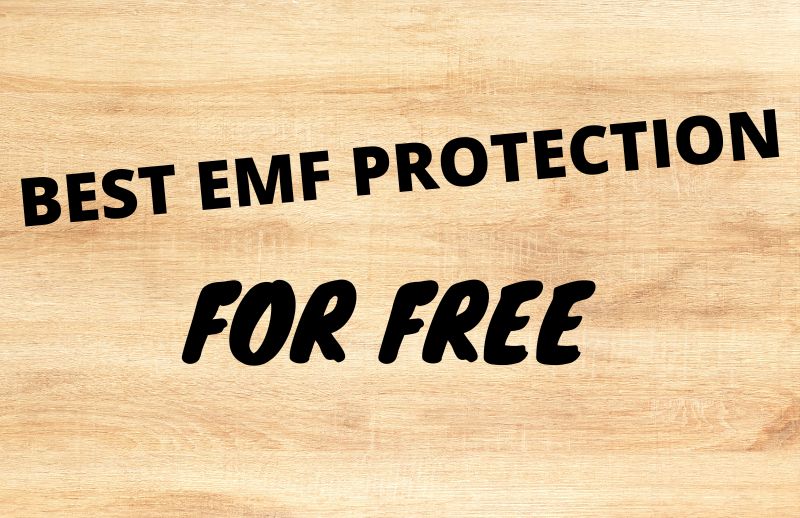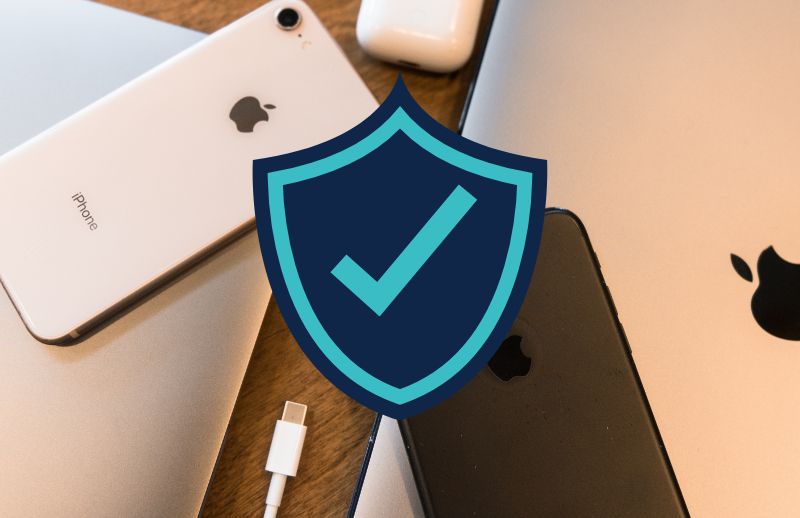After years of measuring radio frequency (RF) emissions in residential settings, I’ve found that our homes have become increasingly complex environments for RF fields.
If you’re interested in understanding the full spectrum of electromagnetic fields in your home environment, you might want to check out this comprehensive guide to residential EMF exposure.
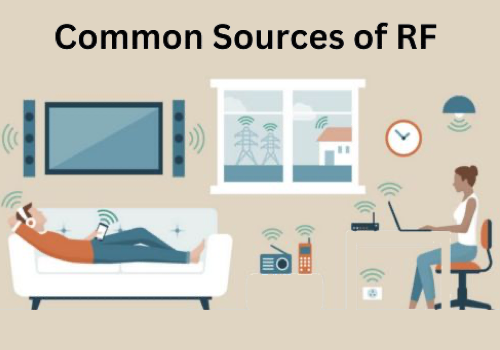
Unlike electric and magnetic fields, radio frequencies can reflect off surfaces, penetrate materials differently, and create complex patterns of constructive and destructive interference. Let me share what I’ve learned about the RF sources that fill our modern living spaces.
- Understanding Radio Frequencies in Your Home
- Major Sources Inside Your Home
- External Sources Affecting Your Home
- Hidden Contributors
- EMF Measurement Equipment Guide
- How to Take Accurate Readings
- Practical Tips for Reduction
- The Impact of Modern Technology
- Looking to the Future
- Frequently Asked Questions (FAQ)
Understanding Radio Frequencies in Your Home
My first experience measuring RF fields was eye-opening. Using my EMF meter (Trifield TF2), I discovered that what seemed like a quiet home electronically was actually filled with various RF signals across multiple frequency bands.
What surprised me most was how the RF environment changed throughout the day, with different devices becoming active and inactive, creating a dynamic RF landscape that varies with our daily routines.
Major Sources Inside Your Home
The modern home has become a hub of wireless communication, with numerous devices constantly transmitting and receiving radio frequency signals. These sources vary greatly in both power output and frequency range, creating a complex web of RF activity that changes throughout the day. Here are the main contributors I’ve identified through extensive measurements.
Wi-Fi Networks
Wi-Fi has become one of the most pervasive sources of RF in our homes:
- Routers operating on 2.4 GHz and 5 GHz bands
- Mesh network systems creating multiple transmission points
- Smart home hubs and extenders
- Neighboring networks that penetrate our living spaces
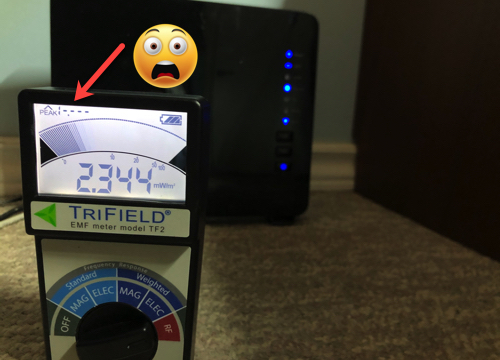
Mobile Devices
Personal wireless devices contribute significantly to our RF environment:
- Smartphones with cellular, Wi-Fi, and Bluetooth transmissions
- Tablets and laptops with multiple radio systems
- Smartwatches and fitness trackers
- Wireless headphones and earbuds
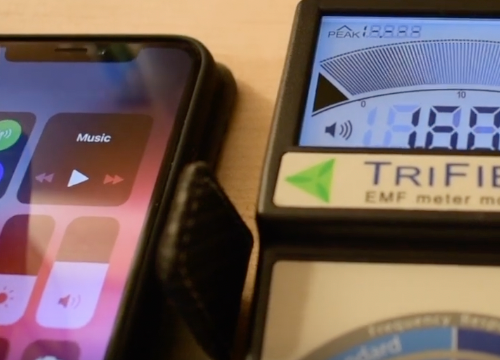
Smart Home Devices
The rise of home automation has introduced many new RF sources:
- Smart speakers and voice assistants
- Security cameras and video doorbells
- Smart thermostats and HVAC controls
- Automated lighting systems and switches
- Smart appliances with wireless connectivity
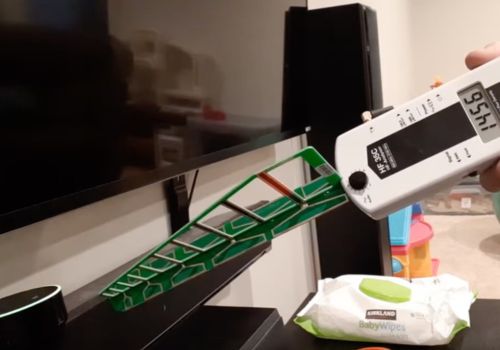
Entertainment Systems
Modern entertainment setups often include multiple RF sources:
- Smart TVs with built-in Wi-Fi and Bluetooth
- Gaming consoles with wireless controllers
- Streaming devices and media centers
- Wireless speakers and sound systems
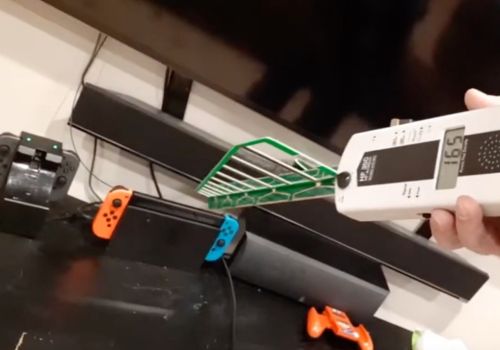
Communication Devices
Traditional communication devices remain significant contributors:
- Cordless phone base stations
- Baby monitors and security intercoms
- Amateur radio equipment
- Family radio service (FRS) devices
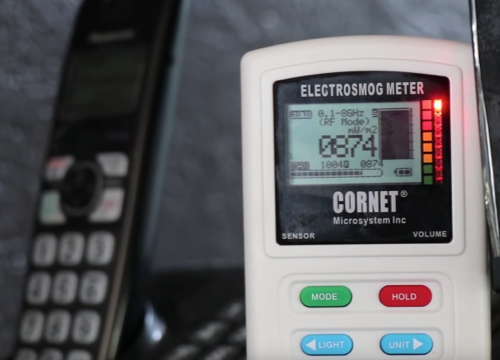
Computer Peripherals
Wireless computer accessories create their own RF environment:
- Wireless keyboards and mice
- Bluetooth accessories
- Wireless printers and scanners
- USB wireless adapters
External Sources Affecting Your Home
The RF environment in our homes isn’t just affected by our own devices. External sources play a significant role in shaping the overall RF exposure levels, often creating baseline levels that our internal sources add to.
Cellular Networks
Modern cellular infrastructure creates ubiquitous RF fields:
- Cell towers and base stations
- Small cell installations for 5G networks
- Repeaters and signal boosters
- Emergency service radio systems
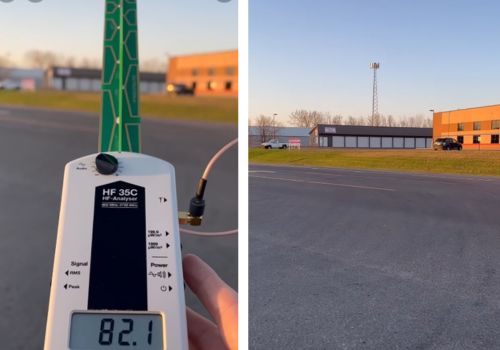
Broadcasting Systems
Traditional broadcasting continues to contribute to ambient RF levels:
- FM and AM radio transmitters
- Television broadcast stations
- Weather radio services
- Public safety radio systems
Hidden Contributors
Many sources of RF emissions in our homes aren’t immediately obvious. These hidden sources can contribute significantly to the overall RF environment, often operating in ways we might not expect.
Building Systems
Modern buildings incorporate various wireless systems:
- Fire alarm systems
- Security and access control systems
- Building automation networks
- Emergency lighting systems
Unintentional Emitters
Some devices create RF emissions as a byproduct of their operation:
- LED light drivers
- Switch-mode power supplies
- Electric motors with poor RF suppression
- Dimmer switches and motor controls
EMF Measurement Equipment Guide
A comprehensive overview of EMF meters and analyzers for every skill level, from beginner-friendly devices to professional-grade equipment, with price points and key features.
Basic RF Meters (Entry Level)
- Trifield TF2 ($186 USD): Best for beginners, measures RF, magnetic, and electric fields
- Cornet ED88T Plus ($180 USD): Good frequency range, easy to read display
- Safe and Sound Pro II ($390): Professional-grade accuracy, data logging capability
Professional Spectrum Analyzers
- Acoustimeter AM-11 ($419.99 USD): Highly sensitive, audio feedback feature
- Gigahertz Solutions – HFEW35C RF Meter ($1,437 USD): High accuracy, ideal for 5G and Wi-Fi
How to Take Accurate Readings
- Baseline Measurements
- Take readings at different times of day
- Document background RF levels
- Note weather conditions (can affect readings)
- Proper Technique
- Hold meter at arm’s length
- Move slowly through space
- Rotate meter to find peak readings
- Take measurements at different heights
- Interpreting Results
- Common RF levels in μW/m²:
- Under 10: Very low exposure
- 10-100: Low exposure
- 100-1000: Moderate exposure
- Over 1000: High exposure
- Consider peak vs. average readings
- Account for cumulative exposure
- Common RF levels in μW/m²:
Practical Tips for Reduction
Based on years of testing, here are effective strategies for managing RF exposure:
- Use wired connections when possible
- Enable airplane mode on devices at night
- Position wireless routers away from living spaces
- Use RF-shielding paints or materials where needed
- Configure devices to use minimum necessary power
- Disable unused wireless features
- Create “low RF” zones in bedrooms
- Use timer switches on wireless devices
- Consider hardwired alternatives for security systems
- Keep wireless devices away from sleeping areas
The Impact of Modern Technology
The RF landscape in homes continues to evolve with new technology:
- Implementation of 5G networks
- Increased IoT device adoption
- Smart grid infrastructure
- Vehicle-to-home communication systems
- Wireless charging technologies
Looking to the Future
As our homes become increasingly connected, managing RF exposure becomes more challenging. Key considerations include:
- Balancing connectivity needs with exposure reduction
- Implementing “smart” RF management systems
- Understanding cumulative exposure effects
- Adopting new shielding technologies
- Planning for increased wireless device adoption
Remember that RF environments are highly dynamic and unique to each location. While this guide reflects my extensive experience, your situation may present different challenges and opportunities for RF management. I’ve created a practical guide to conducting EMF measurements in your own space.
The goal isn’t to eliminate all RF sources, as many provide valuable services, but rather to make informed decisions about device placement, usage patterns, and implementation of wireless technologies.
As home automation and wireless connectivity continue to expand, staying informed about RF sources and management strategies becomes increasingly important for creating healthy living environments.
Frequently Asked Questions (FAQ)
Here are some of the most common questions I get about understanding and measuring EMF radiation. For those interested in taking measurements themselves, you might find my review of top-rated EMF detection equipment helpful.
General EMF Questions
What is EMF radiation?
EMF (Electromagnetic Field) radiation includes various forms of energy emissions from electronic devices and power systems. It encompasses Radio Frequency (RF) radiation, extremely low frequency (ELF) fields, and other electromagnetic emissions. These fields are produced by everything from cell phones to power lines.
Are all EMFs harmful?
Not all EMFs are equally concerning. Natural EMFs (like the Earth’s magnetic field) are essential for life. Man-made EMFs vary in their potential effects based on frequency, intensity, and duration of exposure. The scientific consensus is that very high levels can have biological effects, while the impact of long-term low-level exposure is still being studied.
How do I know if I have high EMF levels in my home?
You can determine EMF levels through proper measurement using EMF meters. Common signs of high EMF levels include:
- Multiple wireless devices in close proximity
- Nearby cell towers or power lines
- Smart meter installations
- Multiple electronic devices in sleeping areas
Measurement Questions
How often should I measure EMF levels?
Regular measurements are recommended:
- Monthly baseline readings
- After installing new electronic devices
- When changing room layouts
- If experiencing EMF-related symptoms
- When new external sources appear (cell towers, etc.)
Which meter should I buy as a beginner?
For beginners, we recommend the Trifield TF2 or Cornet ED88T Plus. These meters are:
- Easy to use
- Measure multiple field types
- Provide accurate readings
- Include clear displays
- Offer good value for money
Protection Questions
What’s the most effective way to reduce EMF exposure?
The most effective approach follows these principles:
- Distance (increasing distance from sources)
- Time (reducing exposure duration)
- Shielding (using appropriate materials)
- Avoidance (eliminating unnecessary sources)
Do EMF protection devices really work?
Effectiveness varies by product and application. Look for:
- Independent testing results
- Specific attenuation measurements
- Scientific validation
- Customer reviews and testimonials

